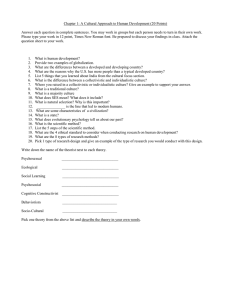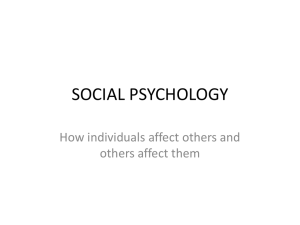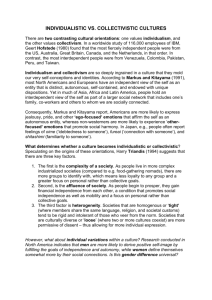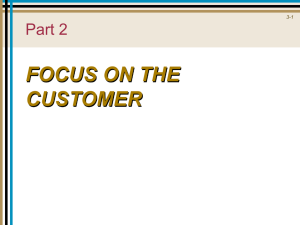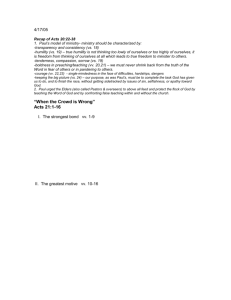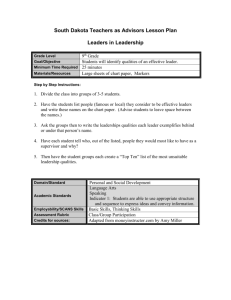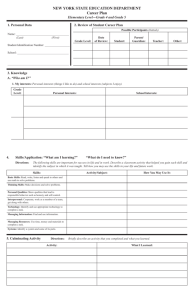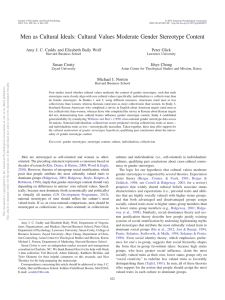OConnor, Sociology
advertisement
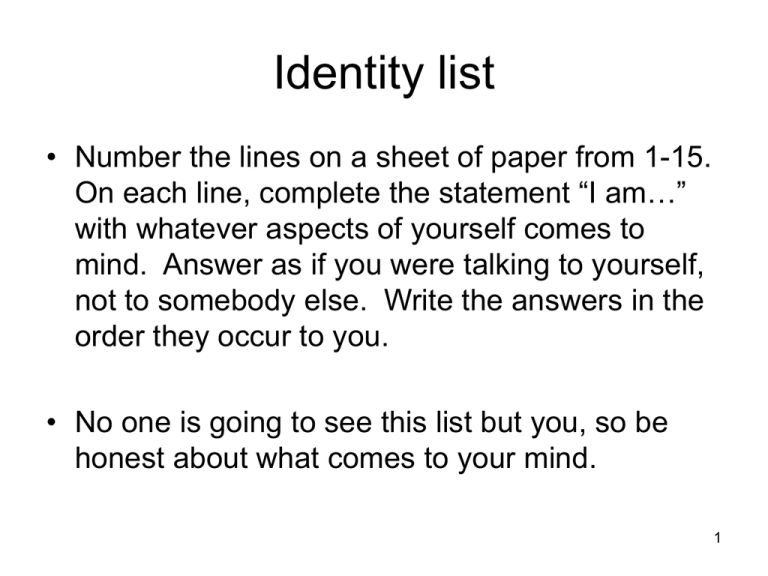
Identity list • Number the lines on a sheet of paper from 1-15. On each line, complete the statement “I am…” with whatever aspects of yourself comes to mind. Answer as if you were talking to yourself, not to somebody else. Write the answers in the order they occur to you. • No one is going to see this list but you, so be honest about what comes to your mind. 1 Self concept: • Knowledge about who we are • Beliefs and feelings about ourselves 2 • Status – position we occupy • Assigned: given at birth • Achieved: attained through individual effort • Look again at your identity list: • Place a 1 after an assigned status • Place a 2 after an ascribed status 3 • Sociological • Role • Collectivistic Psychological Dispositional Individualistic 4 • Collectivistic – descriptions that refer to the self in relation to others: • Roles (student, boyfriend) • Membership in groups (Smith family member, UWM student) • Social identities based on ethnicity, race, sex 5 • Individualistic – qualities that apply to you personally. • Self assured • Believe in free enterprise • Bad singer 6 • Read each of your statements and classify them into either a collective or an individualist quality category. • C = collectivistic • I = individualistic 7 Did you tend to list individualistic qualities earlier in the list than collectivistic ones? 69% o N s 31% Ye 1. Yes 2. No 8 Which qualities are more central to your identity? 1. Collective components 2. Individualistic components 85% du a iv i In d C ol le ct iv lis e tic co co m po ne m po ... nt s 15% 9 Would you expect people in western cultures to identify self concept more in terms of ascribed or achieved statuses? 87% 1. Ascribed 2. Achieved ch i A A sc r ib e ev ed d 13% 10 Trait adjectives • • • • • • • aggressive friendly quiet bold persistent sensitive romantic intelligent superstitious sentimental athletic trusting energetic shy 11 Self reference effect: • We can process info relevant to ourselves better than other types of info • We spend more time thinking about words/events if they are relevant to ourselves 12 • Master identity/status: the status that takes precedence over all other statuses 13 Which of the following is an example of an achieved status? Brother Uncle Father Cousin 96% 4% 1% in ou s C th e r 0% Fa U nc l e r ro th e B 1. 2. 3. 4. 14 nt ity id e is tic lis ct iv ol le C In d iv i du a tio n os i is p D ti de nt ity al id e nt ity li de ic a ol og yc h Ps nt ity One of my identities is “teacher.” Which of the following concepts applies to that identity? 1. Psychological 74% identity 2. Dispositional identity 3. Individualist 18% 8% identity 1% 4. Collectivistic identity 15 When I asked you to recall the names I mentioned at the beginning of class I was demonstrating which of the following? 1. Self-concept 2. Self efficacy 3. Self reference effect 4. Self esteem 88% 9% Se lf e st ee ef fe ct m 0% ce lf re fe re n ffi c Se lf e Se Se lfc on ce pt ac y 3% 16 Self esteem: • the way we evaluate our self identities 17 How do we assess ourselves? • 1. Evaluate our good qualities vs our bad qualities. • 2. Evaluate ourselves by comparing our self concepts with our concepts of our ideal selves. • 3. Evaluate ourselves in comparison with a reference group. 18 • Downward social comparison: comparing yourself to someone worse off than you (may increase self esteem) • Upward social comparison: comparing yourself to someone who is better off than you • (may lower self esteem) 19 Roots of self-esteem • Direct experiences of competence/self efficacy – Evaluation of ability to perform a task or reach a goal • Social feedback – Especially the appraisals from significant others. 20
